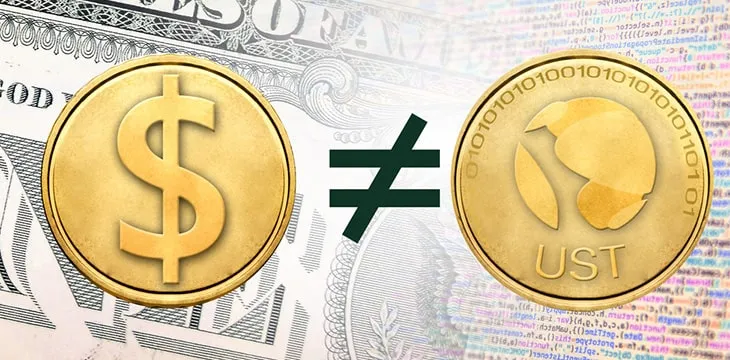|
Getting your Trinity Audio player ready...
|
Terra’s multi-billion-dollar collapse in May was a turning point for digital asset regulations, and since then, many jurisdictions have tightened their oversight over the sector. The U.S. Congress is the latest, and with a new proposed bill, it would ban “endogenously collateralized” stablecoins like TerraUSD (UST) for the next two years.
The bill was introduced earlier this year and was set to be voted on in the House of Representatives two months ago. However, lawmakers pushed the negotiations forward, with Rep. Maxine Waters (D-CA) saying in July that they would get back on it after the August recess.
Bloomberg now reports that the bill has been amended to encompass algorithmic stablecoins. Under the latest version of the bill, it would be illegal to create and issue “endogenously collateralized stablecoins.” This would cut off stablecoins that rely entirely on the value of another digital asset created by the same issuer to maintain their peg.
UST was a prime example of an endogenously collateralized stablecoin. It depended on economic incentives in the market to stay pegged to $1—arbitrage traders burned LUNA and minted UST depending on whether it was above or below $1.
This economic incentive mechanism faced its first real test in May when UST depegged, and rather than incentivize arbitrage traders, it led to a bank run, and the entire project collapsed. The project’s founder, Do Kwon, is now a fugitive who could be on Interpol’s Red Notice soon.
U.S. lawmakers want to ensure that such a collapse doesn’t reoccur, at least not in the next two years. Maxine, who chairs the House Financial Services Committee, has been working with Rep. Patrick McHenry (R-NC), the committee’s ranking member, to reach an agreement on the legislation. It’s still unclear if McHenry has approved the latest version of the draft bill, Bloomberg says, meaning that further changes could be made before the bill is voted on.
Maxine is a strong proponent for tighter regulations, stating earlier this year that “investigations have shown that many of these so-called stablecoins are not, in fact, backed fully by reserve assets.” If left unchecked, they could threaten U.S. financial stability.
It’s also unclear when the lawmakers will put the bill to a vote. However, sources tell the outlet that it could be as soon as next week. If it goes into October before it’s voted on, it might have to be pushed aside for several weeks as legislators focus on the upcoming November midterm elections.
No more free rides for stablecoin issuers
The era of stablecoin issuers having unchecked freedom to do as they wish, including illegally propping up prices of some tokens, is firmly behind us. Aside from banning algorithmic stablecoins, the draft bill will rein in other stablecoin issuers.
While nonbank entities can still issue stablecoins, they’d have to go through a much more rigorous process before being allowed to create new projects. This includes having to apply for licensing by their state regulators, and if approved, they would have to get the Federal Reserve’s authorization.
These issuers will also be unable to comingle user funds, be it stablecoins or cash, with the company’s assets. The bill says this will better protect users in the case of bankruptcies—and there has been a fair number this year.
The U.S. Congress isn’t alone in seeking to stamp out algorithmic stablecoins. A leaked draft of the EU’s Markets in Crypto Assets (MiCA) legislation reveals that European lawmakers have also learned their lesson from the UST collapse.
The draft, seen by one news outlet, wants these stablecoins brought under the oversight of regulators regardless “of how the issuer intends to design the crypto asset, including the mechanism to maintain a stable value.”
When it was first drafted, MiCA didn’t encompass algorithmic stablecoins—but then again, this was back in 2020 and UST was just launching.
Watch: The BSV Global Blockchain Convention panel, The Future of Financial Services on Blockchain: More Efficiency & Inclusion

 07-06-2025
07-06-2025 





